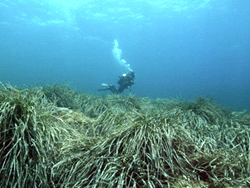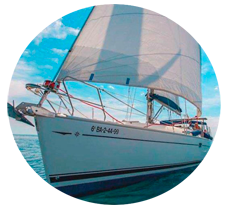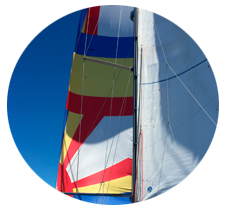The oceanic Posidonia
What is Posidonia Oceanica and why do we avoid casting the anchor on it?
Posidonia oceanica, commonly known as Neptune grass or Mediterranean tapeweed, is an angiosperm plant (not an algae) adapted to live under water. It is a vital element to preserve the Mediterranean’s ecosystems, prevent coastal erosion and also balance the presence of CO2 in the sea and atmosphere.
The main threats of posidonia ecosystems are marine constructions, contamination of coastal waters, making artificial beaches, global heating of ocean waters due to climate changes, removal of dead leaves on beaches and boat anchorage.
Due to its very slow regenerative process posidonia determines non renewable resources/ecosystems. At this moment Posidonia oceanic meadows are disappearing from all the Mediterranean Sea.

The meadow function, comparable to that of a forest, is essential for the ecological balance of marine resources. It depurates and oxygenates coastal waters, giving them quality and transparency. It also shelters many species of fish and invertebrates.
Posidonia meadows also play a fundamental role in the conservation and protection of beaches and sand dunes, both very fragile and of great ecological value, forming marine reefs parallel to the coast as high as 1’5 to 2 meters high, thus creating a natural barrier which diminishes the action of breaking waves. Furthermore, dead Posidonia leaves on the beach also form barriers against erosion caused by winter storms. Between storms these dead leaves become buried under new coming sand, thus consolidating the beach.
These ecosystems which occupy approximately half a million square meters are now in global regression, with a yearly estimated loss of 1 to 2%, four times superior to tropical forest losses. In the Mediterranean the percentage goes up to as much as 5%. What is worse is that due to this plant’s slow growth (2cm/year) and its scarce production of seeds makes the process irreversible since the recuperation of a meadow requires various centuries.
The importance of Posidonia Oceanica meadows is well known and is included in the European Union Directive Council as a prioritary protected habitat. The meadows in Ibiza (Eivissa) and Formentera were declared in 1999 as Patrimony of Humanity by UNESCO.
More information here:
http://marenostrum.org/vidamarina/vegetalia/fanerogamas/posidonia/

The meadow function, comparable to that of a forest, is essential for the ecological balance of marine resources. It depurates and oxygenates coastal waters, giving them quality and transparency. It also shelters many species of fish and invertebrates.
Posidonia meadows also play a fundamental role in the conservation and protection of beaches and sand dunes, both very fragile and of great ecological value, forming marine reefs parallel to the coast as high as 1’5 to 2 meters high, thus creating a natural barrier which diminishes the action of breaking waves. Furthermore, dead Posidonia leaves on the beach also form barriers against erosion caused by winter storms. Between storms these dead leaves become buried under new coming sand, thus consolidating the beach.
These ecosystems which occupy approximately half a million square meters are now in global regression, with a yearly estimated loss of 1 to 2%, four times superior to tropical forest losses. In the Mediterranean the percentage goes up to as much as 5%. What is worse is that due to this plant’s slow growth (2cm/year) and its scarce production of seeds makes the process irreversible since the recuperation of a meadow requires various centuries.
The importance of Posidonia Oceanica meadows is well known and is included in the European Union Directive Council as a prioritary protected habitat. The meadows in Ibiza (Eivissa) and Formentera were declared in 1999 as Patrimony of Humanity by UNESCO.
More information here (in spanish):
http://marenostrum.org/vidamarina/vegetalia/fanerogamas/posidonia/








